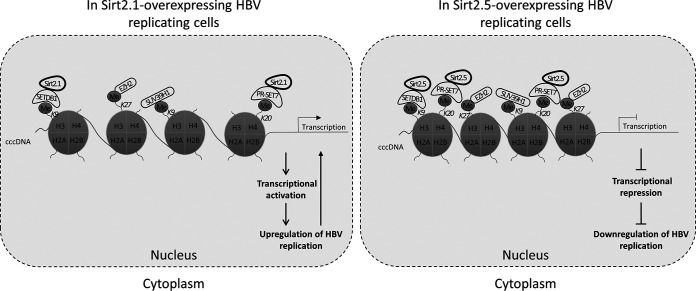FIG 8.
Sirt2.5 overexpression increases deposition of transcriptional repressive epigenetic markers on HBV cccDNA by repressive HKMTs. Repressive HKMTs, such as SETDB1, SUV39H1, PR-Set7, and EZH2, are recruited onto cccDNA in Sirt2.5-overexpressing cells to a greater extent than in Sirt2.1-overexpressing cells. H3K9me3 by SETDB1 and SUV39H1, H4K20me1 by PR-Set7, and H3K27me3 by EZH2 was more prominent in Sirt2.5-overexpressing cells than in Sirt2.1-overexpressing cells. Although both Sirt2.1 and Sirt2.5 interact with SETDB1 and PR-Set7 and can be recruited onto cccDNA, the Sirt2.5-SETDB1 and –PR-Set7 interactions are strengthened upon HBV replication, thereby inducing increased deposition of repressive markers in Sirt2.5-overexpressing cells. Although EZH2 and SUV39H1 cannot interact with either Sirt2.1 or Sirt2.5, more of them are recruited onto cccDNA, and deposition of repressive markers is increased in Sirt2.5-overexpressing cells. These repressive epigenetic modifications may silence cccDNA (closed state) and be transcriptionally inactive, thereby reducing viral replication.

